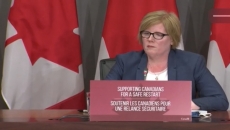The president of an Indigenous women's group says Amber Alert policies across Canada should be reviewed in light of a recent case involving a missing teenager from Cape Breton.
RCMP in Nova Scotia issued a localized emergency alert a week after the 14-year-old girl went missing with a 47-year-old man she knew. That man was arraigned Monday on one count of child abduction.
Police have said they did not issue an Amber Alert because they thought the teenager left with him willingly. They now say new evidence indicates she had been abducted.
Lorraine Whitman, president of the Native Women's Association of Canada, said Wednesday it's a relief the girl from We'koqma'q Mi'kmaq First Nation was found safe, but the case highlights a national problem.
She pointed to the report from the public inquiry into missing and murdered Indigenous women and girls, which highlighted a pattern of police categorizing missing girls as runaways, slowing down investigations.
Whitman says the "runaway" stereotype puts underage girls in danger and criteria for alerts should be reviewed to prevent the same delays from affecting another minor.
"They may have ran away, but we have to look at it more in depth," she said in an interview. "We just can't take it as a case that they wanted to leave. We have to look into it because there are more underlying areas that we have to investigate as well."
The 2019 report on missing and murdered Indigenous women and girls cited testimony from families who "shared how stereotypes and victim blaming served to slow down or to impede investigations into their loved ones' disappearances or deaths."
"The assumptions tied to Indigenous women, girls ... by police as 'drunks,' 'runaways out partying,' or 'prostitutes unworthy of follow-up' characterized many interactions, and contributed to an even greater loss of trust in the police and in related agencies," the report said.
Whitman also took issue with the RCMP's statement that the girl left willingly from her foster home with the man she knew. She said a 14-year-old can't make that decision on her own, and suggested that if a non-Indigenous, wealthier child had been involved, the alert would have been sent right away.
"This is almost a week after this young girl has been missing, and in the woods," Whitman said. "Our lives are very important as well. She was a minor and the RCMP had a due diligence that they had to follow."
Video surveillance footage placed the 14-year-old and the man at a gas station in Catalone, N.S., on Aug. 13. Before she was found on Aug. 24, community members had been searching the area and pressuring police for more urgency in finding her and to issue an Amber Alert.
The We'koqma'q chief and council had offered a $5,000 reward for information leading to her whereabouts. Police issued a localized alert to residents east of the Mira River in Cape Breton a week after the girl ran away.
According to the Canadian Centre for Child Protection, Amber Alert programs are provincially operated and only the police can issue them. The criteria for issuing them vary, but the basic requirements include the disappearance of someone under the age of 18 who is suspected of being abducted.
RCMP Cpl. Lisa Croteau said Wednesday that information before the girl was found indicated she had not been abducted. New evidence, however, supports the child abduction charge, she said. Croteau said she could not go into specifics about the evidence because the case is before the courts.
But Croteau said police did not consider an Amber Alert necessary, because they did not believe the man was on the run with the child.
"From the onset of this investigation, we had strong evidence that they still were camping in the Cape Breton area and that they did not intend to leave the island," Croteau said.
She cited ongoing talks with the provincial government about the general protocols for sending public alerts to Nova Scotia residents, adding that it's not within the police's power to change them.
Those consultations follow criticism that a provincewide emergency alert was not sent on April 18-19, during the manhunt for a killer who claimed 22 lives in the province. Police were chasing a gunman who was dressed as a Mountie during parts of his rampage.
When asked if the Nova Scotia RCMP detachment would take a closer look at how it approaches cases involving missing Indigenous kids, Croteau said the force treats all missing person cases seriously regardless of race.






